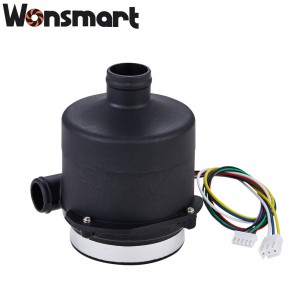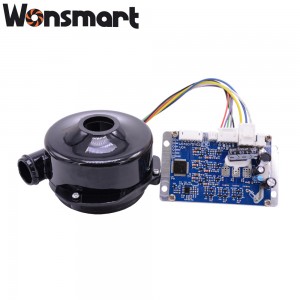
mini turbo blower for 5kw fuel cell
Blower Features
Brand name: Wonsmart
High pressure with dc brushless motor
Blower type: Centrifugal fan
Voltage:24vdc
Bearing: NMB ball bearing
Type: Centrifugal Fan
Applicable Industries:Manufacturing Plant
Electric Current Type: DC
Blade Material: plastic
Mounting: Ceiling Fan
Place of Origin:Zhejiang, China
Certification: ce, RoHS, ETL
Warranty: 1 Year
After-sales Service Provided: Online support
Life time(MTTF): >20,000hours (under 25 degree C)
Weight: 490 grams
Housing material:PC
Unit size: D90*L114
Motor type:Three Phase DC Brushless Motor
Controller: external
Static pressure: 13 kPa


Drawing

Blower Performance
WS9290B-24-220-X300 blower can reach maximum 38m3/h airflow at 0 kpa pressure and maximum 13kpa static pressure.It has maximum output air power when this blower run at 7kPa resistance if we set 100% PWM, It has maximum efficiency when this blower run at 7kPa resistance if we set 100% PWM.Other load point performance refer to below P-Q curve:

DC Brushless Blower Advantage
(1) WS9290B-24-220-X300blower is with brushless motors and NMB ball bearings inside which indicates very long life time; MTTF of this blower can reach more than 20,000hours at 20degree C environmental temperature
(2) This blower needs no maintence
(3) This blower drived by a brushless motor controller have many different control functions such as speed regulation,speed pulse output,fast acceleration, brake etc.it can be controlled by intelligent machine and equipment easily
(4) Drived by brushless motor driver the blower will have over current, under/over voltage,stall protections.
Applications
This blower can be widely used onto air pollution detector,air bed,air cushion machine and ventilators.
How to Use the Blower Correctly

FAQ
Q: Do you have the test and audit service?
A: Yes, we can assist to get the designated test report for product and the designated factory audit report.
Q: When can I get the quotation?
A: We usually quote within 24 hours after we get your inquiry. If you are very urgent to get the price, please tell us so that we will regard your inquiry priority.
Q: Can we get some samples? Any charges?
A: We do supply samples, but it is not free.
To extend a DC motor's service life, protective devices and motor controllers are used to protect it from mechanical damage, excessive moisture, high dielectric stress and high temperature or thermal overloading.These protective devices sense motor fault conditions and either annunciate an alarm to notify the operator or automatically de-energize the motor when a faulty condition occurs. For overloaded conditions, motors are protected with thermal overload relays. Bi-metal thermal overload protectors are embedded in the motor's windings and made from two dissimilar metals. They are designed such that the bimetallic strips will bend in opposite directions when a temperature set point is reached to open the control circuit and de-energize the motor. Heaters are external thermal overload protectors connected in series with the motor's windings and mounted in the motor contactor. Solder pot heaters melt in an overload condition, which cause the motor control circuit to de-energize the motor. Bimetallic heaters function the same way as embedded bimetallic protectors. Fuses and circuit breakers are overcurrent or short circuit protectors.
Ground fault relays also provide overcurrent protection. They monitor the electric current between the motor's windings and earth system ground. In motor-generators, reverse current relays prevent the battery from discharging and motorizing the generator. Since D.C. motor field loss can cause a hazardous runaway or overspeed condition, loss of field relays are connected in parallel with the motor's field to sense field current. When the field current decreases below a set point, the relay will deenergize the motor's armature. A locked rotor condition prevents a motor from accelerating after its starting sequence has been initiated. Distance relays protect motors from locked-rotor faults. Undervoltage motor protection is typically incorporated into motor controllers or starters. In addition, motors can be protected from overvoltages or surges with isolation transformers, power conditioning equipment, MOVs, arresters and harmonic filters. Environmental conditions, such as dust, explosive vapors, water, and high ambient temperatures, can adversely affect the operation of a DC motor. To protect a motor from these environmental conditions, the National Electrical Manufacturers Association (NEMA) and the International Electrotechnical Commission (IEC) have standardized motor enclosure designs based upon the environmental protection they provide from contaminants. Modern software can also be used in the design stage, such as Motor-CAD, to help increase the thermal efficiency of a motor.







